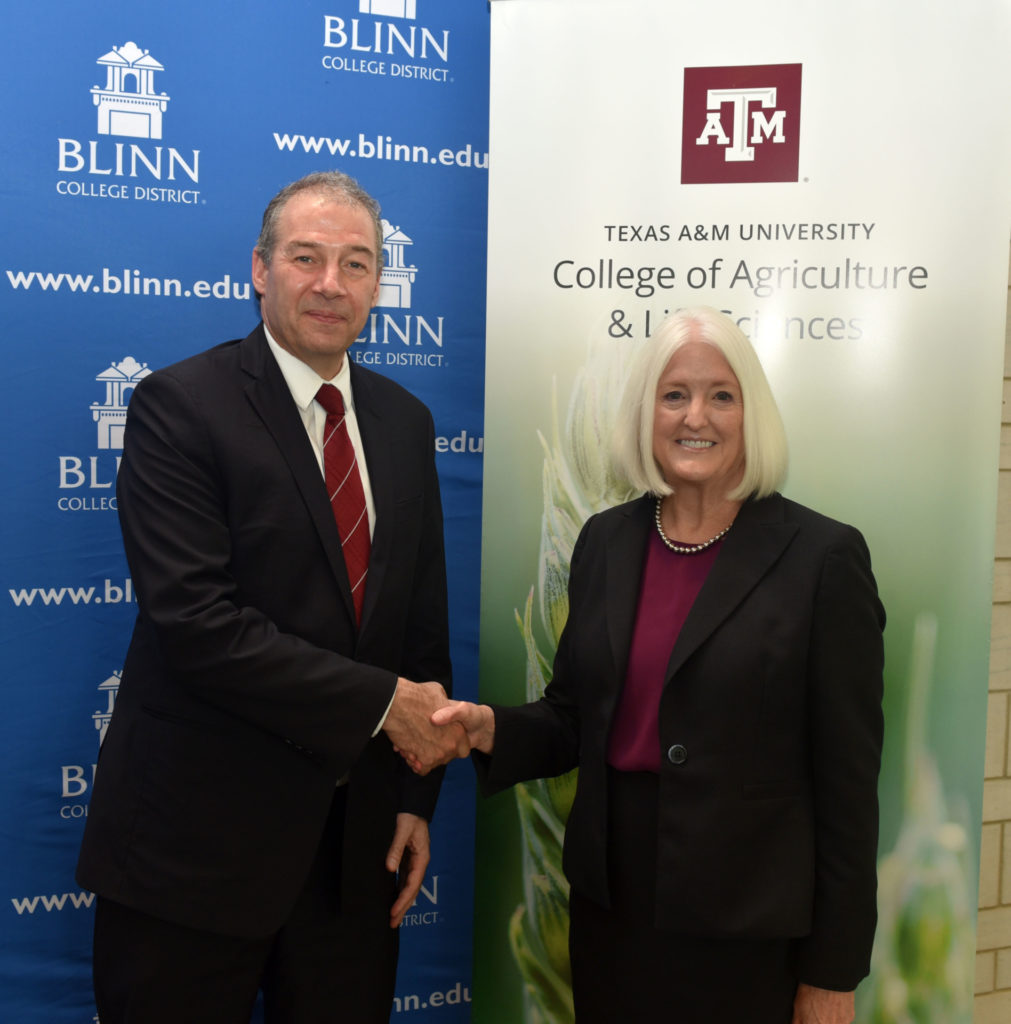New transfer agreements signed with community colleges
Blinn, Angelina and South Texas colleges to participate
New transfer articulation agreements signed in August 2021 between the Texas A&M College of Agriculture and Life Sciences and three community colleges — Blinn College, Angelina College and South Texas College — will allow transfer students to more easily enroll at Texas A&M University.

These agreements advance the university’s goal of providing affordable, world-class higher education that prepares students for their chosen careers in agriculture and life sciences.
“Texas A&M University is dedicated to the land-grant mission that established our institution to serve the people of Texas,” said Patrick J. Stover, Ph.D., vice chancellor of Texas A&M AgriLife, dean of the College of Agriculture and Life Sciences, and director of Texas A&M AgriLife Research. “We are excited that these new agreements will help increase transfer student enrollment at Texas A&M and help prepare a diverse cohort of graduates who are ready to join this mission to serve.”
Blinn College’s transfer agreement
The Blinn College District serves a 13-county area through five campuses, including the RELLIS and Bryan campuses in Bryan-College Station and campuses in Brenham, Sealy and Schulenberg. The new agreement between the College of Agriculture and Life Sciences and Blinn provides pathways toward bachelor’s degrees in agricultural economics, bioenvironmental sciences, poultry science, plant and environmental soil science, and horticulture from Texas A&M.
Blinn has a longstanding tradition of close partnerships with Texas A&M. In fall 2020, for example, 5,892 Blinn students transferred to Texas A&M.
“We are excited to build on that relationship with the College of Agriculture and Life Sciences to provide Blinn students a seamless pathway to an agricultural bachelor’s degree through this one-of-a-kind partnership,” said Mary Hensley, Ed.D., chancellor of the Blinn College District. “We look forward to seeing our students succeed at Texas A&M and as leaders in the agricultural industry.”
Angelina College’s transfer agreement
Angelina College in Lufkin serves students throughout East Texas. The Texas A&M College of Agriculture and Life Sciences executed an agreement to facilitate the admissions of students who complete an Associate of Science degree at Angelina into two undergraduate programs in the Texas A&M Department of Biological and Agricultural Engineering: Bachelor of Science in agricultural systems management or Bachelor of Science in biological agricultural engineering. The partnership is expected to generate highly trained Aggie graduates who may return to East Texas to build their career.
“Angelina College is pleased to collaborate with Texas A&M University to offer students in the college’s service area an opportunity to pursue these career paths. AC selected the programs in consultation with local employers to ensure that students who complete one of these programs can pursue their chosen careers in East Texas,” said Michael Simon, Ed.D., president of Angelina College.
South Texas College’s transfer agreement
South Texas College serves students in the Rio Grande Valley through five campuses, two higher education centers and a virtual campus. The new articulation agreement will help students at South Texas College transfer into in-demand Bachelor of Science programs at Texas A&M: agricultural economics, bioenvironmental sciences, food science and technology, poultry science, plant and environmental soil science, or horticulture.
Transfer agreements avoid loss of credits, time
The transfer articulation agreements are based on a review of specific courses at the community colleges to ensure they meet Texas A&M standards. By following specified course checklists, students can know that their courses will transfer with no loss of credits and satisfy freshman- or sophomore-year requirements for their desired degree at Texas A&M College of Agriculture and Life Sciences.
“We look forward to fostering these key partnerships as we work together to provide opportunities for our students in agriculture and life sciences,” Stover said. “These students will strengthen the workforce in key areas to serve the state of Texas.”


